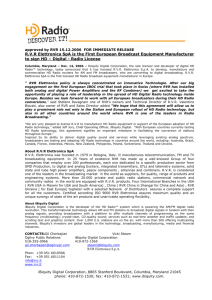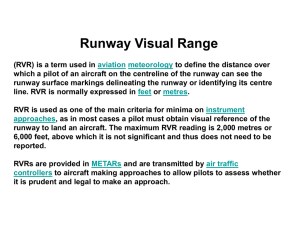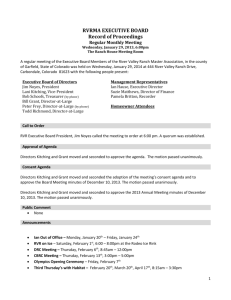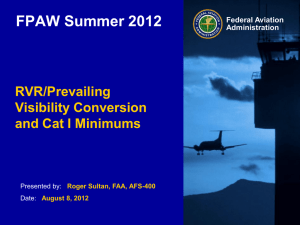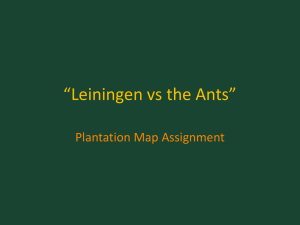click here
advertisement
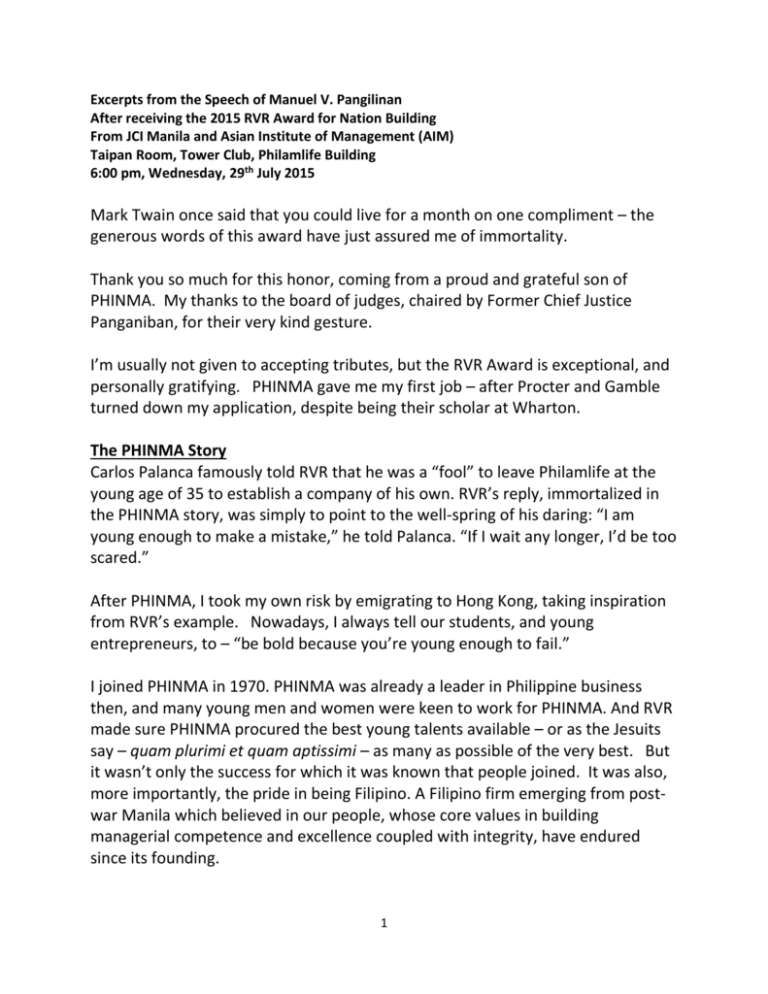
Excerpts from the Speech of Manuel V. Pangilinan After receiving the 2015 RVR Award for Nation Building From JCI Manila and Asian Institute of Management (AIM) Taipan Room, Tower Club, Philamlife Building 6:00 pm, Wednesday, 29th July 2015 Mark Twain once said that you could live for a month on one compliment – the generous words of this award have just assured me of immortality. Thank you so much for this honor, coming from a proud and grateful son of PHINMA. My thanks to the board of judges, chaired by Former Chief Justice Panganiban, for their very kind gesture. I’m usually not given to accepting tributes, but the RVR Award is exceptional, and personally gratifying. PHINMA gave me my first job – after Procter and Gamble turned down my application, despite being their scholar at Wharton. The PHINMA Story Carlos Palanca famously told RVR that he was a “fool” to leave Philamlife at the young age of 35 to establish a company of his own. RVR’s reply, immortalized in the PHINMA story, was simply to point to the well-spring of his daring: “I am young enough to make a mistake,” he told Palanca. “If I wait any longer, I’d be too scared.” After PHINMA, I took my own risk by emigrating to Hong Kong, taking inspiration from RVR’s example. Nowadays, I always tell our students, and young entrepreneurs, to – “be bold because you’re young enough to fail.” I joined PHINMA in 1970. PHINMA was already a leader in Philippine business then, and many young men and women were keen to work for PHINMA. And RVR made sure PHINMA procured the best young talents available – or as the Jesuits say – quam plurimi et quam aptissimi – as many as possible of the very best. But it wasn’t only the success for which it was known that people joined. It was also, more importantly, the pride in being Filipino. A Filipino firm emerging from postwar Manila which believed in our people, whose core values in building managerial competence and excellence coupled with integrity, have endured since its founding. 1 Lessons Learned I actually joined the PHINMA Group as Executive Assistant to the President of Filoil marketing, Titong Chuidian. One of the earlier tasks Titong asked me to do, I was still very young then, was to recommend an increase in the petty cash fund that he himself approves. Wanting to showboat my newly-minted Wharton degree, I studiously looked into this, and submitted a six-page memo full of numbers and statistical analysis. Titong called me to his office and with my memo on hand, casually said – “Let’s just raise this from 2,000 to 5,000 pesos a month.” So Lesson # 1 – Keep it short and simple. I was also assigned to oversee PHINMA’s coconut plantation in Siasi, Sulu. One afternoon in April 1970, I received a message by single side band radio from Siasi – “plantation under attacked. Udjah Umbat killed.” Muslim squatters and our security detail had a skirmish that morning, and their leader was killed in the encounter. I had to fly to Siasi, assess the situation, including the prospect of securing a 1,000 hectare plantation by the sea. I must confess to my gunrunning days in Siasi – procuring armalites, bullets, browning automatic rifle, an armored jeep, and other assorted armaments for our security force. On one of those trips, Oscar and I returned to Manila with a bullet hole in the PHINMA plane’s left wing. As to securing the plantation, I was inspired by the Vietnam war and thought: why not build a trench around the plantation perimeter 12 kilometers long, about half the length of EDSA, with poisoned spikes. When I presented to the Filagro board this “brilliant” solution, FCR looked at me with amusement; RVR of bewilderment – mixed with that expression – “I can’t believe what I’m hearing.” Lesson # 2 – Keep it real. If RVR were PHINMA’s right side of the brain, FCR was the left side of it. FCR was analytical and conservative, RVR creative and enterprising. FCR was subtle and Filipino, RVR direct and western. RVR was the sledgehammer, FCR the sharp blade. Despite their contrasting styles, they made the perfect management alchemy. Finally, I was also assigned to supervise PHINMA’s sugar plantation in Negros. This included the selling of raw sugar, evidenced by Quedans or warehouse receipts. I sold our sugar through Warner Barnes – our usual broker/dealer. On the day that we had to turn over the Quedans, to my horror, we were short. I had 2 no recourse but to buy from the market. A check was prepared to settle. I dreaded sending the check to RVR, so i sent it to FCR instead. The check came back signed – but with a note of gentle rebuke – “Manny, I thought we’re selling sugar, not buying them.” Lesson # 3 – Tell the truth. Always. Thus three invaluable lessons learned – keep it simple, keep it real, tell the truth. A Look at the Future So much of the past. Turning to contemporary times and our thoughts on nationbuilding – you may ask, how do we at First Pacific regard the enormous task of nation building? Nation building must be considered with reference to the basic purpose of men and institutions – the growth of welfare. The test of their efficiency will ultimately rest on some standard by which each performs its respective tasks in improving the lives of our people. The RVR award is not given solely for aesthetics or prestige – it comes with the stern admonition to continue the work of a man who lit the fire in so many of us to greatness. But there’s poverty standing in the way of nation building, and to prosperity. Poverty is the enemy – addressing it must be the business of business. The optimum solution, in our view, is more jobs – not just the quantum of jobs created but jobs capable of inducing a trickle -down effect on the poor. This fundamental ideology defines who we are, and what we do at, First Pacific. The First Pacific Way Thus viewed, inclusive and sustainable growth provides the premise on how we conduct our businesses at First Pacific– selecting the investments which can achieve the twin goals of a decent return on investment, and abating poverty and sharing prosperity. This is why we’ve invested in public infrastructure like tollways to open up new economic corridors, power and water to supply basic utilities, and hospitals to provide social safety nets. 3 In addition, we think we should all consider these opportunities to help alleviate poverty: First, businesses unique to their geographic and resource advantages, such as tourism and mining. Most of these are located in the rural areas where poverty exists. Second, businesses that are byproducts of our labor migration, like medical tourism and retirement homes. Third, agriculture. 72% of our people belong to the D and E clusters. And 70% of our poor live in rural areas. A stagnant agricultural sector exacerbates rural poverty, and incubates an enclave urban poor economy, by forcing massive migration into our cities. Our laws on agricultural development are simply not investor-friendly. We need to encourage large-scale commercial farming by re-considering our agrarian reform law. Witness the success of large scale agriculture in Indonesia, Malaysia, and Thailand, where hectareages are made available in the hundreds of thousands. Our overarching goal must be to feed our people first. Fourth, technology. These past two years, we’ve spent time at Silicon Valley to immerse ourselves in a totally different world. What Brian Chesky, founder of Airbnb, told us last May, describes the reason for our visits – “If you think about it, Airbnb is a giant ship. As CEO, I’m the captain of the ship. But I really have two jobs. The first is to worry everything below the waterline which can sink the ship. The second are areas I’m passionate about – product, brand, and culture.” Let me share three key take-away lessons from the Valley: (1) Failure is not frowned upon. If you must fail, fail fast and move on. One of the common quotes we heard comes from Samuel Beckett, who wrote: “Ever tried, ever failed, no matter. Try again, fail again, fail better.” (2) Disruption is happening anytime, anywhere – not only in telcos but now in the power industry and elsewhere. Businesses today operate in a Darwinian 4 landscape. It will not be the biggest or smartest amongst us which will survive – but those most adaptive to change. (3) The halcyon days of manufacturing – bricks and mortars, iron and smokestacks – are over. A new era of technology and innovation is upon us, emphasizing the supremacy of intellectual capital. That’s why this country has to move closer to IT, engineering and the sciences. Look at Uber and Airbnb – they didn’t exist a few years back. But Uber is now the largest transportation company in the world with a reputed market value of $50 billion. Airbnb is the biggest lodging company with a market value of $24 billion. And yet neither one owns a single asset – no motor vehicle or hotel room. A Boy Named Nico Every year, we sponsor a medical mission to my hometown of Apalit, Pampanga. We give out prosthetics, crutches, wheelchairs, medicine, food and medical assistance to the poor. The lines are dishearteningly long. The saddest part is that some of these ailments are not the result of a cruel twist of fate – but of preventable, poverty-related causes. For example, cleft palates caused by folic acid deficiency, reflects maternal malnutrition – which, in turn, is rooted in poverty. I met a young man from Concepcion, Tarlac named Nico who lost his leg while playing basketball. But that was not the real tragedy. Given up as useless at age 16, he had stopped schooling, and had lost hope. I asked to meet his family, and quietly offered our help. We cannot give up too soon on the Nicos in our midst, I know that when you’ve lost your leg, or when you’re sleeping on the floor of your shanty, or sitting on the steps of your flooded home, it is hard to imagine any future. But we must believe that that future will come, that after dark nights must come bright mornings. Finally, India’s first Prime Minister Nehru captured the essence of what we all should strive to achieve as we build this nation. Nehru said, in August 1947, on the eve of Indian independence and soon after the assassination of his mentor, Mahatma Gandhi: “The achievement we celebrate today is but a step, an opening of opportunity to the greater triumphs and achievements that await us. The service of India means the service of the millions who suffer. It means ending 5 poverty and ignorance and disease and inequality of opportunity. The ambition of the greatest man of our generation has been to wipe every tear from every eye. That may be beyond us, but as long as there are tears and suffering, our work will not be over.” Whilst our work in our country is indeed far from over, may everyone in this room resolve to wipe every tear – in every eye – of every Filipino. If RVR were here with us tonight, I’m quite sure he would agree. 6
